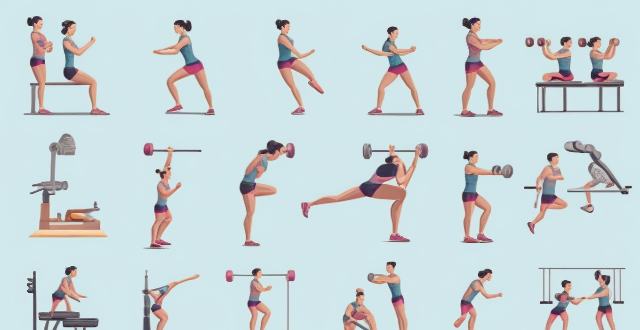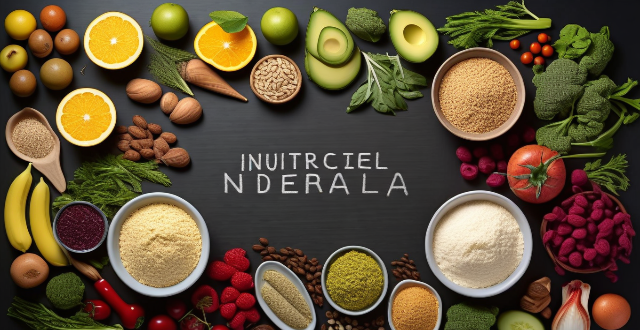Nutrition Eating

How does nutrition impact women's mental health ?
Nutrition has a significant impact on women's mental health. Eating a balanced diet with adequate amounts of vitamins, minerals, and nutrients can help improve mental health. Avoiding processed foods and sugary drinks, drinking enough water, eating breakfast regularly, and getting enough sleep are also essential for good mental health. By taking care of their bodies through nutrition, women can take care of their minds.

What role does nutrition play in maintaining personal hygiene ?
The article emphasizes the importance of nutrition in maintaining personal hygiene. It suggests consuming nutrient-rich foods, developing healthy dietary habits, and supporting the immune system through nutrition to improve overall health and hygiene.

How can women maintain a healthy weight through proper nutrition ?
Maintaining a healthy weight is crucial for overall well-being, and proper nutrition plays a vital role in achieving and maintaining it. Women can maintain a healthy weight through proper nutrition by following these tips: 1. Eat a balanced diet consisting of whole grains, fruits, vegetables, lean proteins, and healthy fats. 2. Control portion sizes to prevent overeating. 3. Eat regularly throughout the day to maintain consistent blood sugar levels and prevent overeating. 4. Drink plenty of water to stay hydrated and prevent overeating due to hunger pangs caused by dehydration. 5. Practice mindful eating by being present while you eat and paying attention to your hunger cues rather than relying on external factors like TV or social media to determine when you're full.

What are the best practices for sports nutrition in managing a healthy lifestyle ?
Sports nutrition is key to managing a healthy lifestyle. Best practices include staying hydrated, eating a balanced diet with carbohydrates and protein, choosing healthy fats, timing meals around workouts, using supplements cautiously, and prioritizing recovery through rest and proper post-workout nutrition. Consulting with a registered dietitian or healthcare professional can provide personalized advice.

What is the relationship between exercise physiology and nutrition for athletes ?
The article discusses how exercise physiology and nutrition are interconnected for athletes, with each influencing the other. It defines exercise physiology as the scientific study of how the body functions during physical activity, covering areas like energy systems, muscle function, cardiovascular responses, respiratory functions, and thermoregulation. Nutrition for athletes involves strategic eating plans to enhance performance, aid recovery, and maintain overall health, focusing on macronutrients, micronutrients, hydration, and timing of intake. The intersection of these two aspects includes fueling performance, recovery and repair, hydration and thermoregulation, energy balance, supplementation, and dietary needs variation. A comprehensive understanding of both exercise physiology and nutrition is crucial for athletes to achieve peak performance.

Can eating habits affect my level of stress before an exam ?
Eating habits can significantly affect your level of stress before an exam. Proper nutrition is crucial for maintaining physical and mental well-being, which impacts your ability to handle stress and perform well during exams. Here are some ways in which eating habits can influence your stress levels: 1. **Blood Sugar Regulation**: Eating balanced meals and snacks throughout the day helps maintain stable blood sugar levels, avoiding mood swings and irritability that can increase stress. 2. **Brain Function**: Your brain requires essential nutrients to function properly. Foods rich in vitamins, minerals, and antioxidants support cognitive function and improve focus, memory, and concentration. 3. **Gut-Brain Connection**: There is a strong connection between your gut health and your mental state. Eating probiotic-rich foods promotes a healthy gut microbiome associated with better mood and reduced stress. 4. **Hydration**: Staying hydrated is essential for overall well-being and can impact your stress levels. Dehydration can lead to headaches, fatigue, and difficulty concentrating, adding to pre-exam stress. 5. **Caffeine Intake**: Moderate amounts of caffeine can provide a temporary boost in alertness, but excessive consumption can increase anxiety and interfere with sleep quality, important for stress management and cognitive performance. 6. **Comfort Eating**: Some people turn to food as a coping mechanism when stressed or anxious, leading to overeating or unhealthy choices that may provide short-term relief but ultimately exacerbate stress due to feelings of guilt or discomfort. By prioritizing nutrient-dense foods, staying hydrated, and avoiding excessive caffeine and comfort eating, you can support your body and mind in managing stress more effectively before an exam.

What role does nutrition play in sports career management ?
Nutrition is a critical component in managing a sports career, as it fuels performance, supports health, aids in weight management, and contributes to mental well-being. Athletes must focus on hydration, balancing macronutrients, ensuring micronutrient intake, timing meals appropriately, and judicious use of supplements. A personalized nutrition plan can optimize training, competition outcomes, and longevity in a sports career.

What are some tips for meal prepping to promote healthy eating habits ?
Meal prepping is an excellent way to promote healthy eating habits. Here are some tips: 1. Plan your meals based on your dietary needs and preferences. 2. Create a shopping list of all the ingredients you'll need for the week. 3. Cook in bulk and choose recipes that can be easily portioned out. 4. Pay attention to portion sizes to avoid overeating. 5. Stay hydrated by carrying a reusable water bottle with you throughout the day.

What are some healthy eating tips for weight loss ?
To achieve weight loss, focus on eating a balanced diet rich in proteins, complex carbohydrates, and healthy fats. Practice portion control, stay hydrated, plan your meals, and limit processed foods. Incorporate fiber-rich foods, be mindful of liquid calories, and don't skip meals. Cooking at home allows for better control over ingredients and portions. Listen to your body's hunger cues and stop eating when comfortably full. These tips promote sustainable weight loss by nourishing the body rather than depriving it.

What role does nutrition play in a comprehensive sports training program ?
Nutrition is a crucial component of sports training, providingNutrition is a crucial component of sports training, providing repair, boosting immunity, providing energy, supporting recovery and repair, boosting immunity, and maintaining hydration. Athletes should consume a balanced diet with carbohydrates, proteins, and fats for optimal energy production. Pre-exercise meals should focus on carbohydrates, during-exercise snacks can include simple sugars for quick energy release, and post-exercise meals should combine carbohydrates and protein for recovery. Proper nutrition strategies can improve athletic performance and overall well-being.

What are the benefits of using a personalized nutrition plan from a health management app ?
Using a personalized nutrition plan from a health management app offers benefits such as improved nutritional intake, weight management, reduced risk of chronic diseases, better mental health, increased variety in diet, convenience, and accountability.

Are sports nutrition supplements more effective when taken before or after a workout ?
The timing of when to take sports nutrition supplements can significantly impact their effectiveness. In this discussion, we will explore the benefits and drawbacks of taking sports nutrition supplements before and after a workout. Taking Supplements Before a Workout: Benefits include energy boost, muscle endurance, and hydration. Drawbacks include digestive discomfort, overstimulation, and timing issues. Taking Supplements After a Workout: Benefits include recovery support, reduced soreness, and hydration restoration. Drawbacks include delayed absorption, less effective for energy, and potential for overconsumption. In conclusion, the effectiveness of sports nutrition supplements depends largely on individual goals, preferences, and specific needs related to training intensity and duration. It is essential to consult with a healthcare professional or sports nutritionist to determine the best strategy for incorporating supplements into your fitness routine.

What are some must-have kitchen gadgets for healthy eating ?
In pursuit of healthy eating, having the right kitchen gadgets can significantly improve the preparation and enjoyment of nutritious meals. This article lists essential tools such as a high-quality chef's knife for efficient chopping, a food processor for versatile cooking tasks, a steamer basket for nutrient-rich cooking, and other devices like slow cookers, spiralizers, and immersion blenders that facilitate healthy meal preparation. Each device is discussed in terms of its benefits, uses, and why it is considered essential for healthy cooking. By incorporating these tools into your kitchen setup, you can make preparing healthy meals easier and more enjoyable, setting the foundation for a lifetime of healthy eating habits.

Can taking sports nutrition supplements compensate for a poor diet and lack of exercise ?
Sports nutrition supplements cannot fully compensate for a poor diet and lack of exercise. While these supplements can provide certain nutrients essential for athletic performance, they cannot replace the overall benefits of a healthy lifestyle. A balanced diet and regular exercise are crucial for maintaining good health and supporting athletic performance. Supplements should be used cautiously and with guidance from a healthcare professional to ensure they complement your overall lifestyle rather than replace it.

How does climate change affect food security and nutrition ?
Climate change significantly impacts global food security and nutrition by causing extreme weather events, altering ecosystems, reducing water availability, affecting marine life, posing agricultural challenges, and diminishing nutrient intake. Mitigation strategies include sustainable agriculture practices, dietary diversification, and research and development to ensure future food security and nutrition.

What is the importance of nutrition in competitive sports ?
In competitive sports, nutrition plays a crucial role in enhancing athletic performance, promoting recovery, and maintaining overall health. Athletes need to consume a balanced diet that provides them with the necessary nutrients to support their training and competition demands. In this article, we will discuss the importance of nutrition in competitive sports and how it can help athletes achieve their goals.

What are some strategies for eating a more plant-based diet ?
Strategies for eating a more plant-based diet include embracing whole foods, experimenting with alternative proteins, getting creative with meal planning, learning about nutritional balance, educating yourself, supporting sustainable practices, and connecting with others. These steps can help you transition to a healthier and environmentally friendly way of eating while ensuring you receive all the necessary nutrients.

Can nutrition affect an athlete's skill level ?
Nutrition is vital for athletes' overall well-being and performance, including skill enhancement, recovery, and injury prevention. It affects cognitive function, physical performance, and recovery, ultimately influencing an athlete's skill level. A balanced diet with proper nutrients can help athletes reach their full potential and succeed in their sports.

How can nutrition affect an athlete's performance ?
Nutrition plays a pivotal role in an athlete's performance, providing essential energy, aiding recovery, and maintaining overall health. A balanced intake of macronutrients, such as carbohydrates for immediate energy, proteins for muscle repair and growth, and fats for long-term energy, is crucial. Micronutrients like vitamins and minerals also contribute to metabolic functions and electrolyte balance. Hydration is vital for fluid balance and preventing performance decline due to dehydration. Timing of nutrient intake, before, during, and after exercise, significantly impacts performance and recovery. Strategic dietary planning, including periodized nutrition and anti-doping compliance, ensures athletes meet their specific needs and maintain clean sport standards. Overall, a well-structured nutritional plan can enhance athletic performance and success in sports.

How can I make healthier choices when eating out at restaurants ?
The text offers a comprehensive guide on how to make healthier choices when eating out at restaurants. It outlines strategies such as planning ahead, starting with a salad, controlling portion sizes, choosing cooking methods wisely, being mindful of sauces and condiments, drinking water, not fearing special requests, and practicing mindful eating. These tips aim to help individuals maintain a balanced and healthy lifestyle while still enjoying dining out experiences. The key takeaways are the importance of moderation, making informed choices, and listening to one's body to avoid overeating.

Is it necessary to take supplements for sports nutrition ?
Supplements for sports nutrition are a controversial topic, with some athletes swearing by them and others considering them unnecessary or even harmful. The necessity of taking such supplements depends on various factors including an individual's diet, training intensity, and specific goals. Sports nutrition supplements come in various forms like pills, powders, bars, and liquids, and include protein supplements, creatine, beta-alanine, caffeine, BCAAs, pre-workout formulas, and post-workout formulas. While a balanced diet can provide most of the nutrients needed for optimal athletic performance, there are certain situations where supplements may be beneficial. These include inadequate nutrient intake from food alone, high-intensity or endurance training, and specific goals or deficiencies. However, there are also potential risks associated with taking sports nutrition supplements, such as overconsumption and imbalanced nutrient intake, contamination and quality concerns, and interactions with medications or other supplements. Therefore, it is essential to choose reputable brands, check for third-party certifications whenever possible, and consult with a healthcare professional before starting any new supplement regimen. In conclusion, whether or not it is necessary to take supplements for sports nutrition depends on individual circumstances. While they can offer benefits for certain athletes and scenarios, they should not replace a well-rounded diet rich in whole foods. Before incorporating any supplements into your routine, consider your specific needs and goals and consult with a qualified healthcare professional or registered dietitian for personalized advice.

What is the importance of nutrition in sports medicine ?
The article discusses the importance of nutrition in sports medicine, emphasizing its role in providing energy for exercise, preventing injuries, enhancing performance, aiding recovery, supporting the immune system, and contributing to mental well-being. It highlights the specific nutrients that are crucial for athletes, such as carbohydrates for energy, protein for muscle repair, iron for oxygen transport, B vitamins for energy conversion, and antioxidants for cell protection. The article also emphasizes the need for a balanced diet to prevent illnesses and improve overall health. It suggests that athletes should work with sports nutritionists to develop personalized diet plans that meet their specific needs and goals.

What role does nutrition play in sports research and development ?
Nutrition is crucial for athletes' performance, recovery, and overall health. It impacts energy production, recovery and repair, hydration, and more. Researchers study the effects of ergogenic aids, supplements, and nutritional strategies to optimize sports performance. Athletes need to consume the right nutrients to fuel their bodies for peak performance.

What is the difference between sports nutrition supplements and regular multivitamins ?
Sports nutrition supplements are designed for athletes and those who engage in regular physical activities, aiming to improve performance, increase muscle strength, and support recovery. Common ingredients include protein, creatine, beta-alanine, BCAAs, and caffeine. In contrast, regular multivitamins cater to the general population, focusing on maintaining overall health by filling nutrient gaps. Typical ingredients are vitamins A, C, D, E, K, B-complex, minerals like calcium, iron, zinc, magnesium, and trace elements. The benefits of sports nutrition supplements revolve around enhanced athletic performance, while regular multivitamins promote immune function, nutrient intake, and general well-being.

Can taking sports nutrition supplements lead to health risks or side effects ?
Sports nutrition supplements can enhance performance and recovery but may pose health risks and side effects such as overdosing, contamination, interactions with medication, and allergic reactions. However, when used appropriately, they can also improve performance, increase muscle mass, aid in recovery, and replenish nutrients. It is crucial to research each supplement, follow recommended dosages, and consult with a healthcare professional to minimize risks and maximize benefits.

What are the key elements of a baby's nutrition during the first year ?
Infant nutrition is crucial for growth and development during the first year. Key elements include breast milk or formula as the primary source of nutrition, the introduction of solid foods around six months, iron supplementation for breastfed babies, vitamin D supplementation, limited fluid intake in the first six months, the introduction of allergens one at a time, and no evidence that early gluten introduction prevents celiac disease. Consulting with a healthcare professional is recommended for specific dietary needs or concerns.

In what ways does climate change contribute to poor nutrition and malnutrition ?
Climate change affects nutrition and health by causing extreme weather events, changes in crop production, loss of biodiversity, food security issues, and limited access to clean water. These factors can lead to malnutrition and related health problems. It is important to take action to mitigate the effects of climate change and ensure that everyone has access to adequate nutrition and resources for good health.